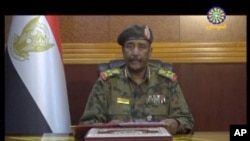Sudan's military council on Wednesday urged opposition leaders to resume negotiations on the transition of power, without preconditions, but the comments could further complicate the already stalled transition process as protest organizers continue their night-time demonstrations demanding civilian rule.
Negotiations collapsed in the wake of a violent crackdown of a protest camp in the capital Khartoum earlier this month. At least 128 people have been killed across the country since security forces moved in to clear the sit-in area outside the military's headquarters on June 3. Authorities offer a lower death toll of 61, including three from security forces.
Gen. Abdel-Fattah Burhan, head of the council, told a gathering of health workers in Khartoum that the council did not have preconditions for returning to the negotiating table with the Forces for Declaration of Freedom and Change, which has represented protesters, so neither should the protesters.
``I repeat our invitation to all political forces and the FDFC to come (for talks), and there is no need for preconditions. ... We do not deny their role in the uprising and the popular revolution ..., but the solution should be satisfactory to all Sudanese factions,'' he said.
Protests leaders could not be reached immediately for comment.
Protest leaders have announced a package of conditions to be met before resuming talks, which included the formation of an international commission to investigate the killings of protesters, restored internet services, adherence to previous deals struck before the breakdown in talks and the return of paramilitary troops to their barracks. The military council rejected the idea of an international probe and said it had started its own investigation along with another one by prosecutors.
Meanwhile, an Ethiopian initiative to resume talks apparently failed to make progress in the deadlock.
A top general in the military council pushed back last week against a key demand from the protest leaders to have the majority in a transitional legislative body. The protest leaders also called for daily night-time demonstrations and marches on Thursday, saying they feared the military council intended to stay as a dominant power in the transition.
Burhan warned of the possibility of another coup as the country ``cannot afford being without a government'' more than three months after the military ousted autocratic president Omar al-Bashir in April.
``We do not want that things went out of control. A new coup could be carried out because of the country's impasse,'' he said.
The country's ruler criticized the sit-in, which was central in Sudan's uprising since it encouraged the military to step in and remove al-Bashir.
``The political agenda were visible in the sit-in square. We have seen diplomats, intelligence agencies and suspicious groups. All of them were present in the sit-in,'' Burhan said. He did not elaborate.
Amid the political impasse, protesters took to the streets late Tuesday in Khartoum and elsewhere in the country in response to the FDFC call to pressure the military to hand over power.
The Sudanese Professionals' Association, which has been spearheading the protests since December, posted several videos and images it said were from different parts of the country. Protesters were seen shouting ``Just fall,'' which was the same chant used in the protests against al-Bashir.
Sudan's Army Calls for Unconditional Talks With Protesters




